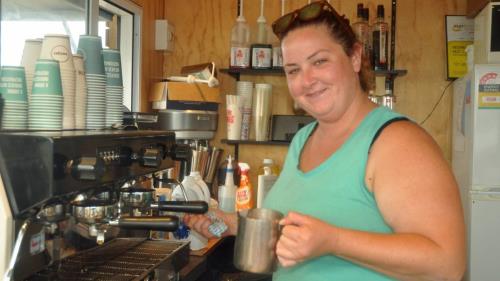Barista fired for swearing in front of customers, or was in friendly banter?
14 August 2019

Do you swear? Do you object to others swearing in your presence? What about in a work environment? What about where you get your coffee?
Barista, Rachel Ferrar was fired from her job at The Flying Bean Coffee Cart on The Esplanade in Petone for swearing in front of customers.
Ferrari worked for the business from February 2015 until her dismissal on 18 May 2018.
Her case was the subject of a recent Employment Relations Authority determination.
Ferrari admitted to swearing occasionally but claimed this was part of her "friendly banter" and believed the regular clientele liked their coffee served with robust social interaction.
Indeed, she went so far as to say her friendly banter contributed to why customers would keep coming back to the coffee cart.
However, one customer was concerned about Ferrari's "friendly banter" and made a complaint to the owners of the coffee cart.
They said that Rachel used inappropriate language on many occasions, including asking "what the f... do you want" when seeking the complainant's coffee order.
The complainant did not mind the language themselves but stated that other customers in the vicinity found the language to be "a bit much".
Generally, whether or not such language is appropriate will depend on where you are.
What workers say on the slaughter board at a freezing works might be one thing. Foul language might be deemed to be acceptable there.
What people say in the dining room of a silver service club might be an entirely different matter and foul language and swearing from staff would clearly be unacceptable. Most of the workplaces in Wellington are somewhere in between.
This is the approach of the Employment Relations Authority. Take the case of Henry Waihape who worked for Affco New Zealand at its Napier tannery.
One day when told to do work that he believed was against workplace policy, he responded to his supervisor by saying "for f...'s sake, what are you on about?". He was sacked.
The authority held that such language was not unusual in the tannery and indeed the workplace had a culture of swearing. Further, they found that while the exchange was "heated", it was not threatening.
Although Waihape had been dismissed he was reinstated and given compensation.
What about the Petone Esplanade with its gentrification and a coffee cart situated in those environs? Is that the rough side of the street or the genteel side of Wellington? Is such language inappropriate for a customer-facing employee, or is it part of the good-humoured rapport between a barista and her regular customers?
Perhaps the barista on the Petone foreshore is in something of a twilight zone. In a case such as this, firm guidance from the employer will probably seal the fate of the workers.
If the employer tolerates bad language then they can't dismiss an employee for using it.
However, if they have issued a clear, preferably written, instruction to the worker that swearing is henceforth unacceptable and the worker again swears that is a different matter. They are likely to be justifiably dismissed.
Swearing or other foul language in a context that is intimidating, abusive or discriminatory will also be treated much more seriously.
In the case of Ferrari, her employer tolerated her so-called "robust" language for quite some time. The key issue was that the employer didn't draw a line in the sand prior to acting on the complaint, and it was not fair to discipline her for conduct they had previously condoned.
For that reason, her dismissal was unjustified and she received lost wages and $12,000 in compensation.
Some establishments are clearly polite language zones and employees should take care to watch their language. Other establishments, such as the tannery, are places where swearing is accepted practice, and no one bats an eye.
Finally, there is the coffee cart on the Petone foreshore which seems to be in a twilight zone.
These variances raise a number of issues. Why do people swear? When is it permissible?
Is it normal social intercourse for some groups in society and therefore acceptable for them, but foreign and unacceptable in other circles?
Is swearing normal even in front of teachers in working-class area schools but rarely uttered in the halls of private schools? Is swearing permissible in the cafeteria for the trades but heresy in the clubs of the genteel? Is it only bad if it is abusive and directed at others?
Is it more common among the millennial generation? Is it more common among men than women?
Whatever view you take of these issues, if you treat others with respect as your guiding principle you are unlikely to be the subject of workplace complaints about swearing and disrespectful behaviour generally and you will be a better person.


